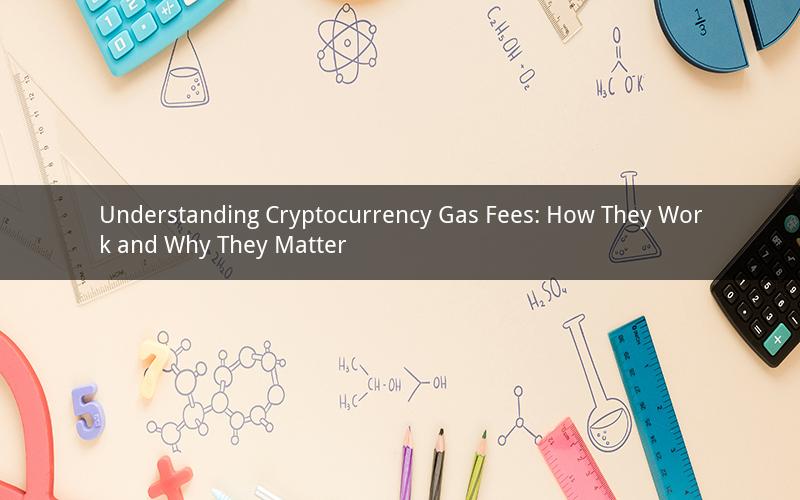
Introduction:
Cryptocurrency gas fees have become an integral part of the blockchain ecosystem. As the popularity of decentralized applications (dApps) and smart contracts continues to rise, understanding how gas fees work and their significance becomes crucial for users and developers alike. In this article, we will delve into what cryptocurrency gas fees are, how they are calculated, and why they matter in the world of blockchain technology.
What is Cryptocurrency Gas Fees?
1. Definition:
Cryptocurrency gas fees refer to the transaction fees paid by users to compensate the network for processing their transactions. These fees are usually denoted in the native cryptocurrency of the blockchain platform, such as Ethereum's ETH.
2. Purpose:
The primary purpose of gas fees is to ensure that the network remains secure and efficient. By incentivizing miners to process transactions, gas fees help prevent spam attacks and ensure that the network's resources are allocated to valuable transactions.
How Are Cryptocurrency Gas Fees Calculated?
1. Transaction Size:
The size of a transaction plays a significant role in determining the gas fee. Larger transactions require more computational resources, resulting in higher gas fees. This is because miners need to process more data and perform more calculations.
2. Network Demand:
The demand for network resources also affects gas fees. During peak times when many users are trying to perform transactions simultaneously, the gas fees tend to increase. Conversely, during off-peak times, gas fees are generally lower.
3. Priority:
Users can set the priority level of their transactions, which can influence the gas fee. Higher priority transactions are more likely to be processed first, resulting in higher gas fees.
Why Do Cryptocurrency Gas Fees Matter?
1. Security:
Gas fees are crucial for maintaining the security of the blockchain network. By incentivizing miners to process transactions, gas fees help prevent malicious actors from launching spam attacks or attempting to manipulate the network.
2. Efficiency:
Gas fees encourage miners to prioritize transactions with higher fees, ensuring that the network remains efficient. This helps prevent congestion and ensures that valuable transactions are processed promptly.
3. Economic Incentive:
Gas fees create an economic incentive for miners to participate in the network. By rewarding miners with transaction fees, gas fees help ensure that the network remains decentralized and secure.
4. User Experience:
Lower gas fees contribute to a better user experience. When gas fees are high, users may be discouraged from performing transactions, leading to frustration and a negative perception of the blockchain platform.
5. Market Dynamics:
Gas fees can also impact the market dynamics of cryptocurrencies. High gas fees can deter users from engaging with dApps and smart contracts, potentially affecting the adoption rate of blockchain technology.
Frequently Asked Questions:
1. Q: Can gas fees be avoided?
A: While it is possible to find alternative ways to reduce gas fees, such as optimizing transaction size or utilizing layer 2 solutions, completely avoiding gas fees is not feasible. Gas fees are an inherent part of the blockchain ecosystem.
2. Q: How can I estimate the gas fee for my transaction?
A: Many blockchain platforms provide gas fee estimators that allow users to calculate the expected gas fee based on the transaction size and network demand. These estimators can be found on various websites and mobile applications.
3. Q: Can gas fees fluctuate significantly?
A: Yes, gas fees can fluctuate significantly based on network demand and other factors. During peak times, gas fees can skyrocket, while during off-peak times, they tend to be lower.
4. Q: Are gas fees the same for all cryptocurrencies?
A: No, gas fees vary across different blockchain platforms. Each platform has its own mechanism for calculating gas fees, which can differ based on factors such as transaction size and network demand.
5. Q: Can I choose the gas fee for my transaction?
A: Yes, users can set the gas fee for their transactions. However, it is important to note that higher gas fees do not guarantee faster transaction processing. Miners prioritize transactions based on a combination of factors, including gas fee and transaction priority.
Conclusion:
Cryptocurrency gas fees play a vital role in the blockchain ecosystem, ensuring network security, efficiency, and economic incentives. Understanding how gas fees work and their significance can help users and developers make informed decisions when interacting with the blockchain network. By considering factors such as transaction size, network demand, and priority, users can optimize their gas fees and contribute to the overall health of the blockchain ecosystem.